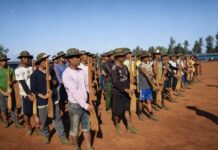Over 300 farmers from 18 townships attended a ceremony on Monday in honor of a farmer shot and killed by Burma Army soldiers outside of a gold mine in eastern Shan State nearly two months ago.
The event was organized by the Shan Farmers’ Network in the victim’s home village, Nai Hai Long, in Tachileik Township.
Loong Sarm was 54 years old when he bled to death in the nearby Loi Kham Hills after being shot in the leg by government forces. The memorial ceremony was scheduled 54 days after his death, explained Nang La, a representative of the farmers’ network in which Loong Sarm was also active.

SHAN previously reported on the October 13 incident, in which five other farmers were seriously injured after they were shot by Burmese government troops while they approached a gold mine which had been ordered in July 2014 to cease operations by the Shan State Ministry of Mines due to the project’s devastating impact on health, livelihoods and the environment.
“The troops who opened fire, from Battalion 330 in Mong Phyak, are claiming they shot in self-defence, despite the fact the villagers were unarmed and were already leaving the area when they were shot at,” stated a Tuesday press release from the Shan Farmer’s Network.

Area farmers say that over 300 acres of land are no longer arable due to the toxic effects of mining by two companies still active in the region, Loi Kham Long Co. and Sai Saik Pyo Ye; Nang La said that villagers have only been compensated for the equivalent of 168 acres.
Meanwhile, local water sources have become polluted by mining waste to the point of being unsuitable for irrigation, bathing or drinking.
Nang La worries that both Loong Sarm’s killing and the destruction of the farmers’ livelihoods has gone unnoticed by both the government and the mining companies.
“Since Loong Sarm died, no representative from the company has talked about this issue. The local authorities didn’t take any responsibility. Only the villagers deal with the case, and give support,” she said. “We want the company to take responsibility for his death.”
SHAN made contact with leadership within Burma’s Ministry of Mines by both phone and email, but at the time of reporting, representatives had not responded to questions about Loong Sarm’s death or the ongoing gold mining in eastern Shan State.
The Shan Farmers’ Network says it will continue to lobby for an end to gold mining and the restoration of the local environment.
“We have always demanded for the companies to stop operations immediately and to compensate for all of the losses,” Nang La said.
Shan State is rich in minerals, including gold, silver, rubies, coal, lead and zinc, yet Burma has been ranked one of the world’s least transparent countries regarding resource revenue and governance.
By SAI AW and SIMMA FRANCIS / Shan Herald Agency for News (S.H.A.N)











Leave a Comments